#napoleonic
Text
apparently napoleon hated murats mustache so much that he ordered it to be omitted from portraits. i think he was just a hater bc murats mustache looked fantastic
#napoleon#napoleon bonaparte#murat#joachim murat#napoleons marshals#napoleonic wars#napoleonic#history
123 notes
·
View notes
Note
Hi! I was wondering is there an actual source stating that calling Napoléon "Buonaparte" was meant as derogatory? I've read here (https://mrodenberg.com/2012/09/13/bonaparte-or-buonaparte/) that on Saint-Helena, the British addressed him as that to undermine his legitimacy as French ruler. Also, I know of another historical figure, Prieur de la Côte-d'Or, who not being very fond of him used the same appellation when talking about Napoleon
Hey! Yes, it was definitely used in a derogatory way to delegitimize Napoleon’s rule by denying his frenchness. Napoleon’s brother, Louis, commented on this in his A Reply to Sir Walter Scott’s History of Napoleon in 1829:
Another visible object is, that of desiring to make Napoleon pass as a foreigner in France. In fact, if such were not the intentions of the author, why this obstinacy in writing the family name of Napoleon, Buonaparte, instead of Bonaparte, consecrated as it is by long habit? Certainly the letter O is not more or less noble or French than the letter U, but it is done to impress a foreign character upon Napoleon, and divide his glory from that of France.
The Italian nation is sufficiently glorious for one to be proud of belonging to it, especially of deriving one’s origin from this beautiful country; but when one has been born under the laws of France, grown up on its soil, with no other knowledge of foreign countries, even of beautiful Italy, than that gained with the victorious legions of France, it is rather too ridiculous to receive from an English author the certificate of a foreigner.
The name Buonaparte was being used by the coalitions before the St. Helena years, especially by the British, so there are quite a lot of examples.
To be clear, Buonaparte was Napoleon’s birth name and the name he preferred to go by for over 20 years. He changed his name during the French Revolution during a wave of name changes across France to more revolutionary and patriotic names. That being said, Bonaparte is already listed as his name on his baptism certificate* in 1771 (“Neapoleone Bonaparte”) when he was nearly 2 years old, which is 3 years into French rule of Corsica. On the same document, his father’s name is spelled as Buonaparte.
It’s a little complicated. The spelling of names weren’t very standardized and were subject to a lot of variation. But the usage of the name Buonaparte was definitely intentional among Napoleon’s enemies. You can tell pretty easily when someone is saying it in a bad faith manner.
From the historian Andrew Roberts (Napoleon: A Life):
For decades thereafter, British and Bourbon propagandists re-inserted the ‘u’ in order to emphasize Napoleon’s foreignness, such as in François-René de Chateaubriand’s snappily titled 1814 pamphlet Of Buonaparte and the Bourbons and the Necessity of Rallying Round our Legitimate Princes for the Happiness of France and that of Europe, in which he wrote: ‘No hope was left of finding among Frenchmen a man bold enough to dare to wear the crown of Louis XVI. A foreigner offered himself, and was accepted’ (Chateaubriand, Of Buonaparte p. 5). Even after the British royal family changed the name of their dynasty from Saxe-Coburg-Gotha to Windsor in 1917, some British historians still ridiculed Napoleon for dropping the ‘u’ from his surname.
It becomes obvious when people change how they refer to Napoleon depending on their current stance or relationship with him. For example, when France and Russia were allies, Tsar Alexander I calls him Napoleon or even the Emperor Napoleon. But when the alliances change and Napoleon is removed from power, Alexander referred to him as Buonaparte.
From the historian Marie-Pierre Rey (Alexander I):
Alexander’s use of the Corsican family name of Buonaparte is interesting, implying that for Alexander Napoléon was no longer emperor of the French — and not even French by nationality!
So there were two purposes to calling him Buonaparte: to accentuate his commoner origins as well as his foreignness in order to delegitimize his authority as head of state.
Thanks for the interesting question!
————
* (The baptism document can be found on Archives de la Corse-du-Sud -> Etat Civil -> Ajaccio -> 1771 -> Baptemes -> 6 MI 4/21)
#asks#my answers#Napoleon#napoleon bonaparte#buonaparte#napoleonic era#napoleonic#first french empire#french empire#Bonaparte#history#french revolution#Corsica#Ajaccio
36 notes
·
View notes
Text
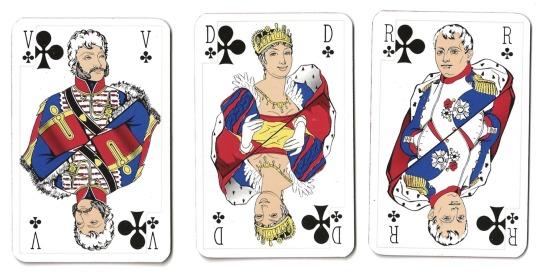

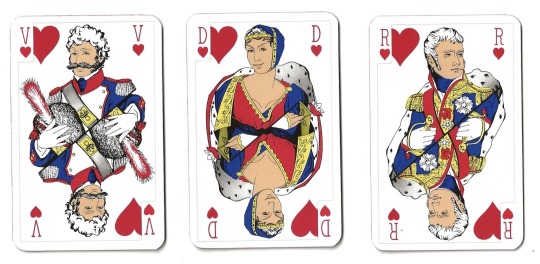

Catel & Farcy 1960s Napoleon Playing Cards
♣️: Napoleon and Josephine
♠️: Soult and (I presume?) his wife Louise
♥️: Lannes and Pauline
♦️: Murat and Caroline
All of the Jacks/Valets are just soldiers, not specific people; all of the numbered cards and aces are regular cards.
#napoleonic#my napoleonic playing cards#catel & farcy#napoleon bonparte#empress josephine#marshal soult#marshal lannes#pauline bonaparte#caroline bonaparte#marshal murat
23 notes
·
View notes
Text
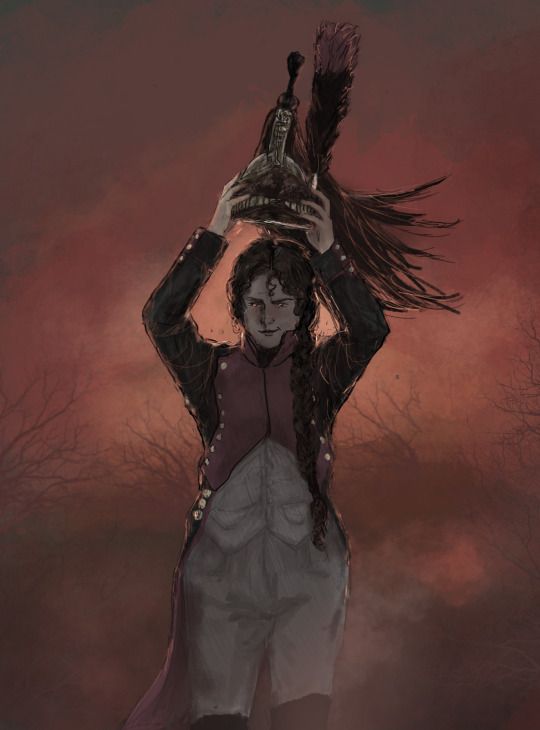
For International Women's Day — a portrait of a brave, invincible and independent woman who officially served in the army (both revolutionary and during the empire), who called Napoleon a "gypsy child", who was captured more than once, who adored her long hair, who once ate a delicious fried ram with Augereau (because of which she was late and was sent to the guardhouse), who organized a shelter for dogs during the war in Spain — the little dragoon "Sans-Gêne", Marie-Thérèse Figueur.
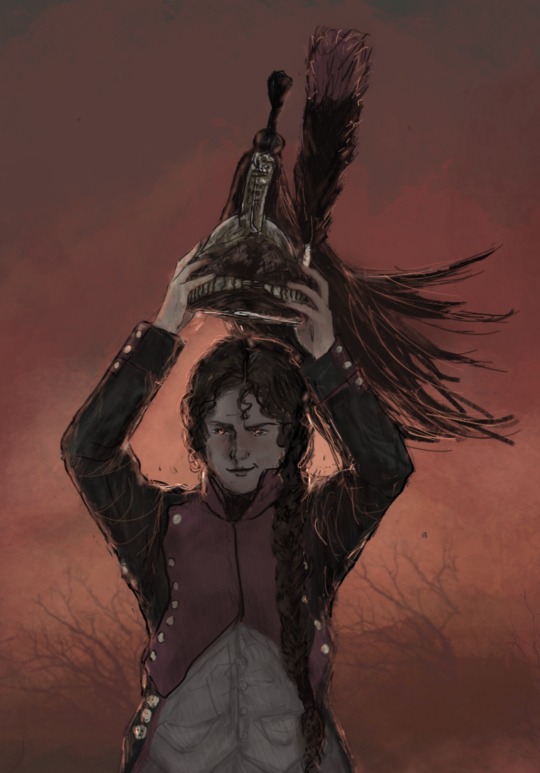
#history#french history#history art#napoleonic#therese figueur#madame sans gene#napoleon#napoleon bonaparte#french revolution
310 notes
·
View notes
Text
OKAY HEAR ME OUT:
All of these edgy science fiction / fantasy novels about overthrowing evil empires and then becoming the very thing that you sought to destroy and the main character ending up as bad as the regime they overthrew and all that, you know?
You could very easily make a dramatised version of the life of Napoleon Bonaparte, transplant it into generic fantasy evil empire world, change the names of the historical figures to fictional names, and all the tumblrinas would eat that up.
Picture this: Napoleon Our protagonist is born the second child in a large family on Corsica generic fantasy island, is sent to a military academy in France evil empire, and begins to rise through the ranks of the army. A revolution occurs, in which the French evil empire monarchy is overthrown, and our protagonist, a supporter of the revolution, fights for the revolutionary government against royalist uprisings and the first coalition other evil empires. Along the way, our protagonist becomes increasingly powerful, as well as being an absolute slut. After a series of military campaigns, our protagonist, seeing the corruption of the directory new evil government, stages a coup and becomes first consul generic fantasy leader. However, over the course of the book, our protagonist has acquired a huge ego and lost many morals, and ends up themself the emperor of France fantasy kingdom. "Morally grey" shenanigans ensue. (Of course, our protagonist would have many many love interests, such as Josephine de Beauharnais hot milf, Jean-Andoche Junot hot best friend, and Tsar Alexander I enemies-to-lovers-to-enemies-again.) (Main character would be characterised as being the most pathetic little person to ever exist who is frequently bullied for being quirky and not-like-other-girls)
#THIS POST IS 100% SILLY OKAY PLEASE DON'T TAKE ANYTHING I SAY SERIOUSLY#history#napoleon#napoleonic#napoleonic era#napoleon bonaparte#books#bookblr#fantasy#fantasy books#fantasy writing#writing#writeblr#literature#locked tomb#iron widow#baru cormorant#i'm sorry for this
707 notes
·
View notes
Text
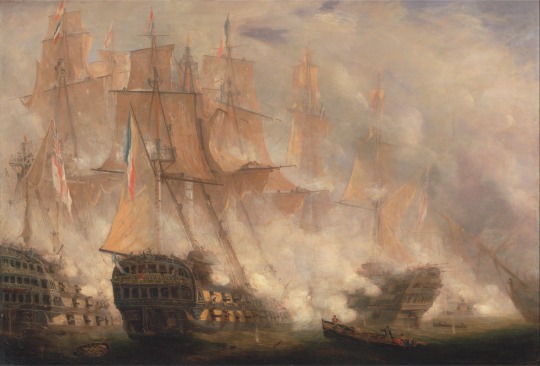
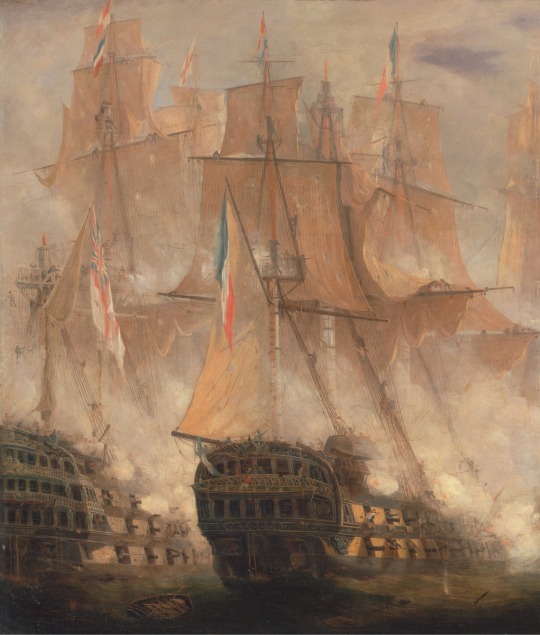
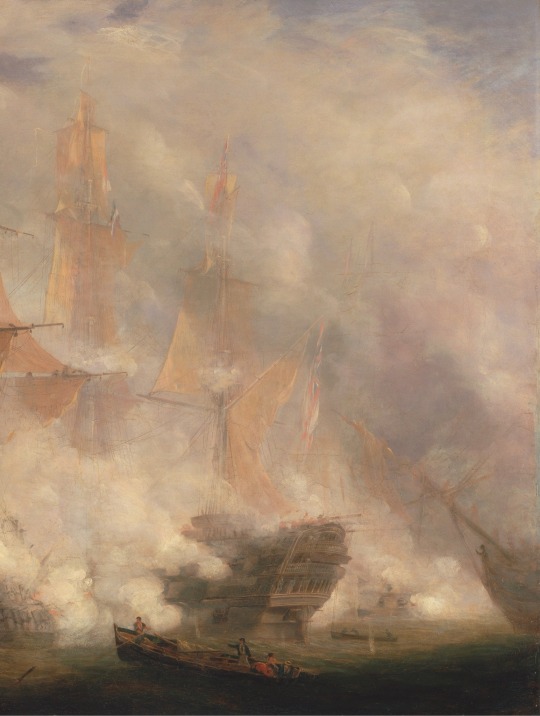
The Battle of Trafalgar by John Christian Schetky
#battle of trafalgar#age of sail#art#napoleonic wars#cape trafalgar#john christian schetky#atlantic#royal navy#great britain#england#britain#france#spain#horatio nelson#trafalgar#english#british#french#spanish#europe#european#history#napoleonic#warship#warships#ships#naval warfare#naval battle#sea
209 notes
·
View notes
Text

The U.S. frigate United States capturing H.B.M. frigate Macedonian: fought, Octr. 25th. 1812 / lith. & pub. by N. Currier, c. 1835-1856 (LOC).
#polls#napoleonic#napoleonic wars#war of 1812#military history#great comet of 1812#charles dickens#george iv#regency era#regency#louisiana#us history#1810s#1812#age of sail#naval battle#who will win the ultimate 1812 showdown?
653 notes
·
View notes
Text
whiteboard doodles dump!
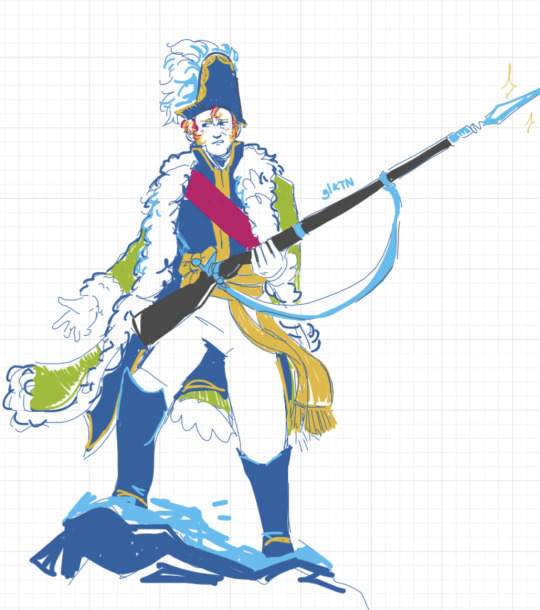
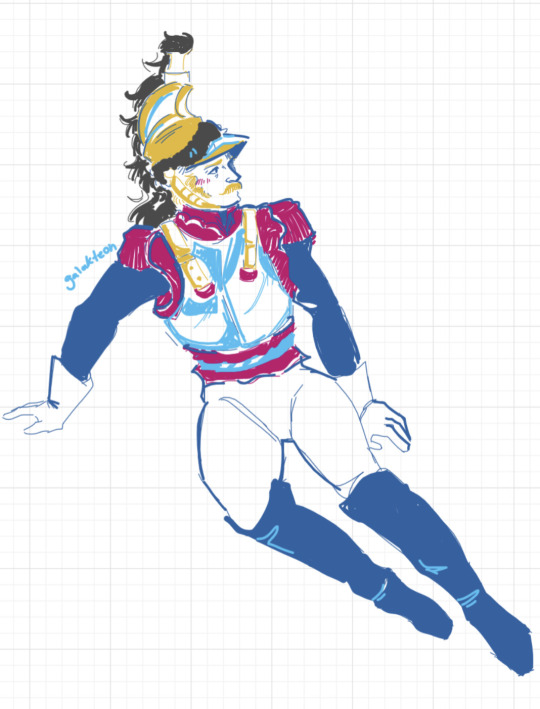
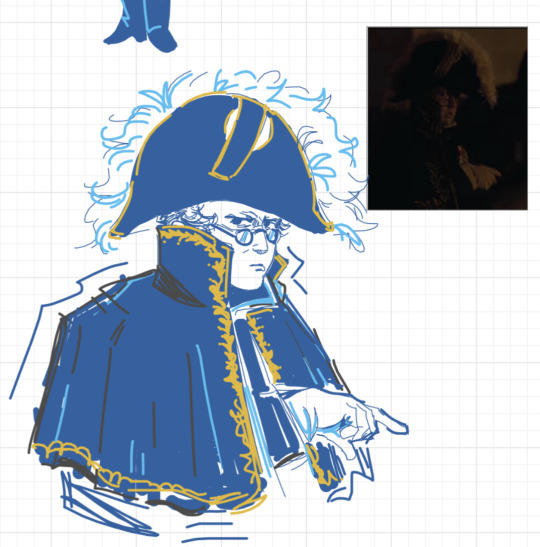
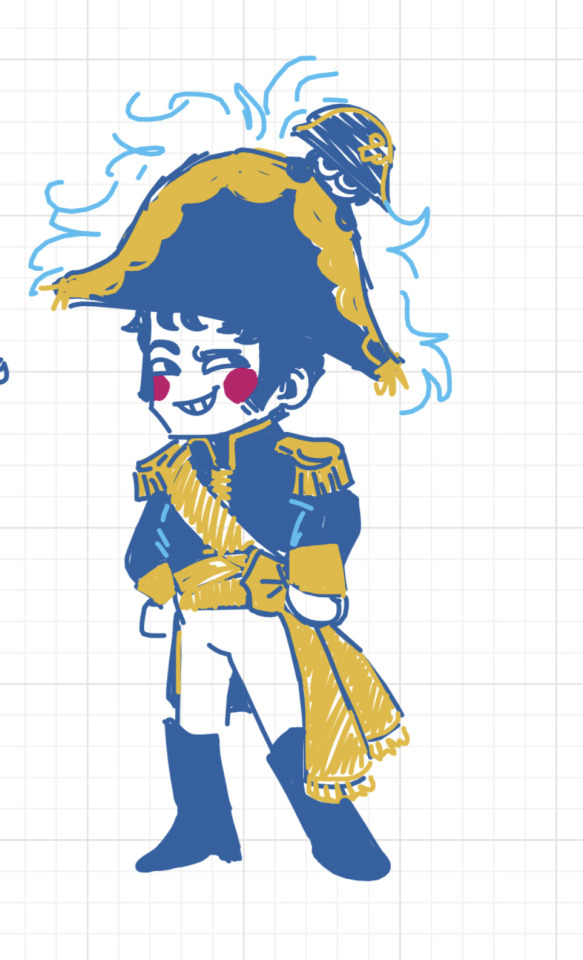
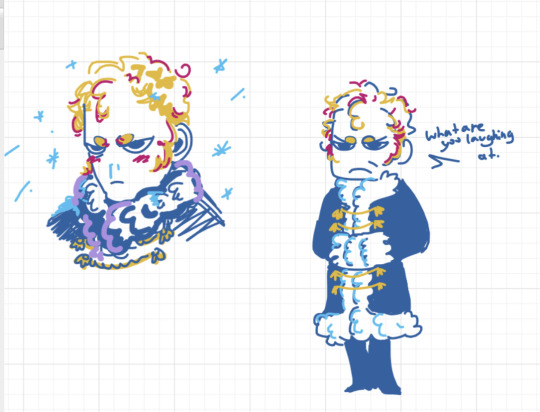
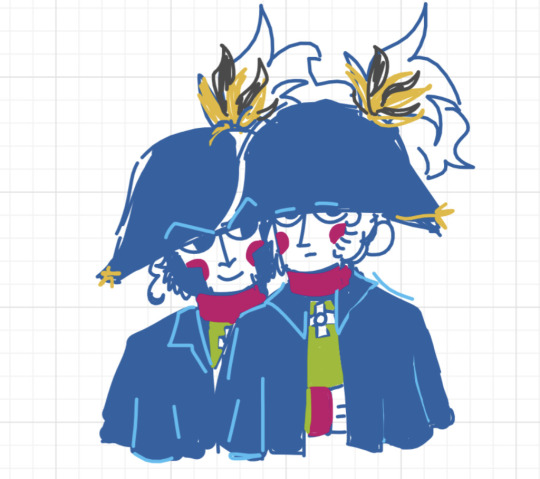
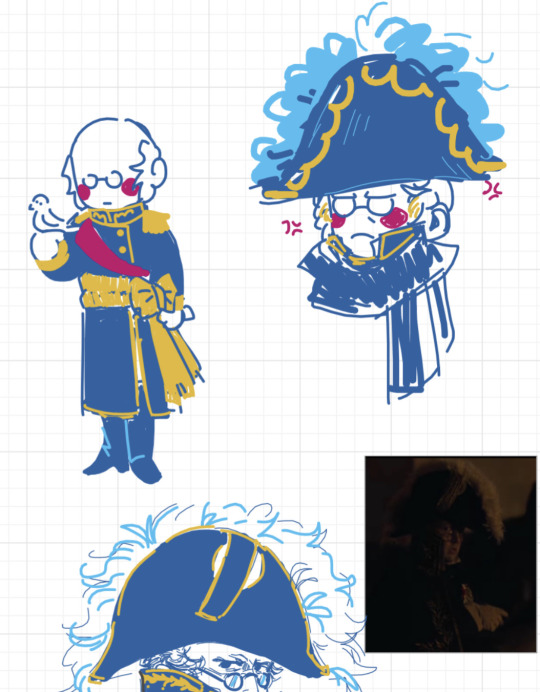



(apologies for some of the pictures being horribly cropped oops)
#i just love this website sm especially drawing with friends#napoleonic wars#art#history art#napoleonic#michel ney#napoleon#lannes#davout#barclay de tolly#bagration#tsar alexander i#my art
144 notes
·
View notes
Text
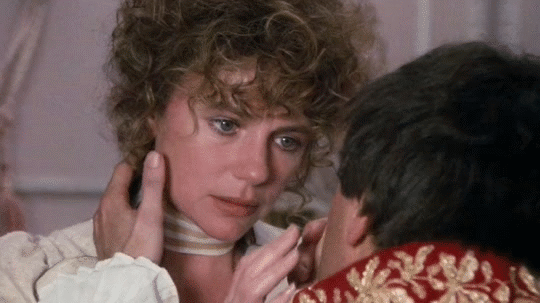
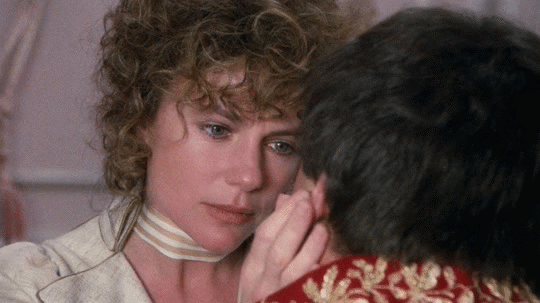
I have seen a resurge of interest in this miniseries since the release of Ridley Scott's disaster. There is an excellent version on youtube that you can watch.
This scene depicts a situation that did actually happen between Napoleon and Josephine. Josephine either faked a pregnancy or mistook a possible pregnancy to avoid having to travel to Italy during Napoleon's campaign in 1796. Eventually she was pushed/forced to visit Napoleon in Italy because Napoleon began to slack his military campaign out of worry/desperation for his wife. Of course it would become obvious that she wasn't in fact pregnant. This scene depicts Napoleon finding out about the 'miscarriage'.
Even though this miniseries is not that historically accurate, it does capture the character of Napoleon so much better than Ridley Scott's new film.
#napoleonic#napoleon bonaparte#napoleonic era#movie#napoleonic wars#napoleon and josephine#armand assante#jacqueline bisset
154 notes
·
View notes
Text

Oh, that sounds kinda weird but oka-



113 notes
·
View notes
Note
hello! i’m looking into adopted yet another 19th century man. i’ve owned several others, and am looking for something unique. are there any unique and peculiar breeds you recommend?
Sure! These heritage and unique 19th century men may not be for everyone, but I want them to get more love.
French soldier left behind on the field of battle during the 1870 Franco-Prussian War.
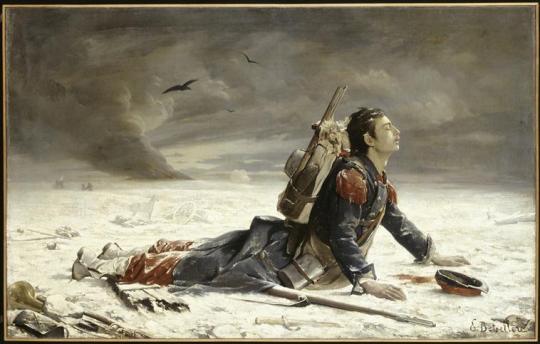
Poor sweetheart!! True story: the model for this 1872 painting, real French soldier Théodore Larran, met the artist Émile Betsellère many times because Betsellère was so touched by his story. Absolutely the type of 19th century man you want to rescue and love.
A jolly flatboatman.
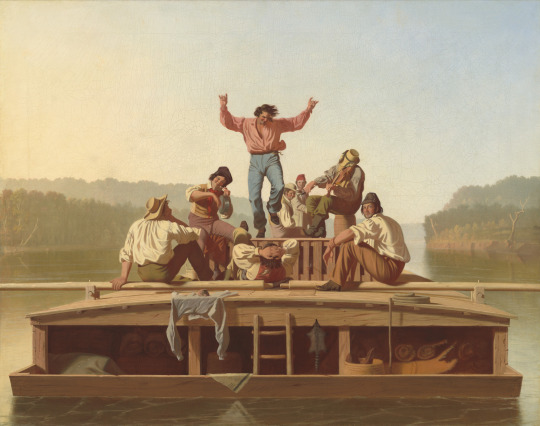
From The Jolly Flatboatmen by artist George Caleb Bingham, 1846.
A good 19th century man doesn't have to be wealthy or formal, as these charming working class fellows attest. Perfect for the aficionado of lively, active 19th century men.
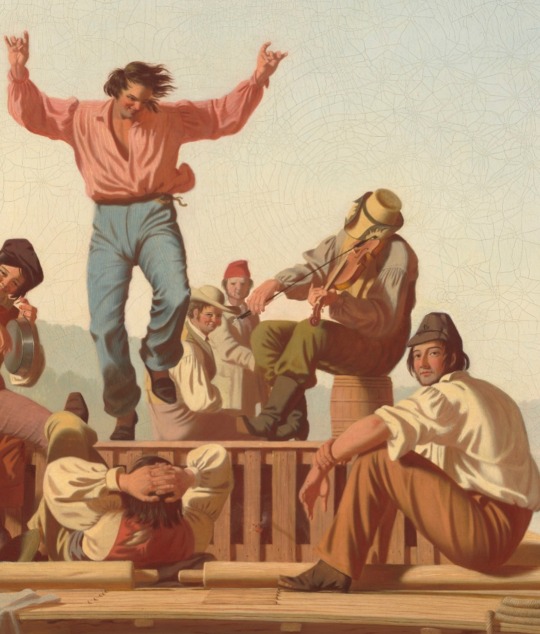
British Army 41st Regiment of Foot Soldier, c. 1800-1815.
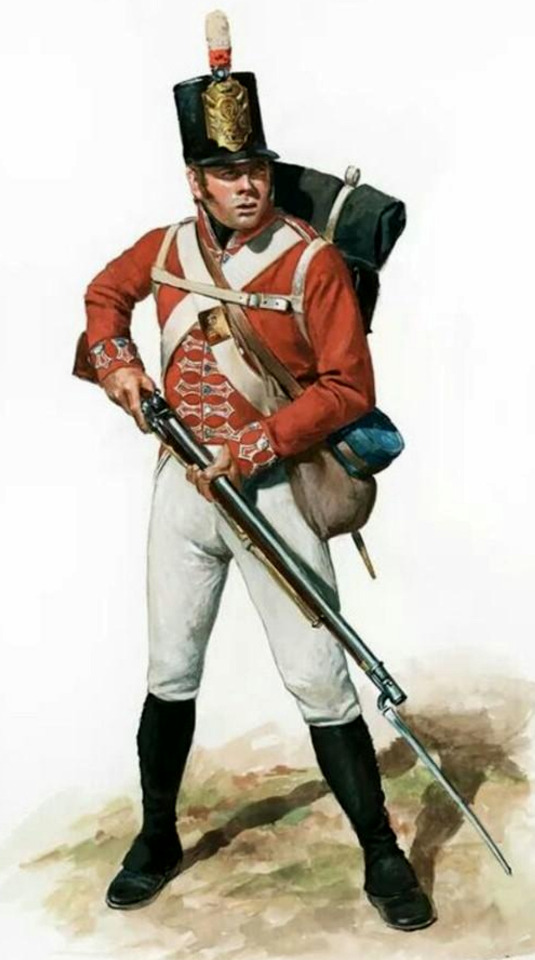
Who doesn't have "a passion for a scarlet coat," as Jonathan Swift phrased it! Your soldier needs a lot of exercise and structure, but he's not picky about his food or bedding. Comes with his own blanket and water bottle! He's a lover, he's a fighter, I recommend delousing him before you bring him into your home.
Cossack Trowsers King.
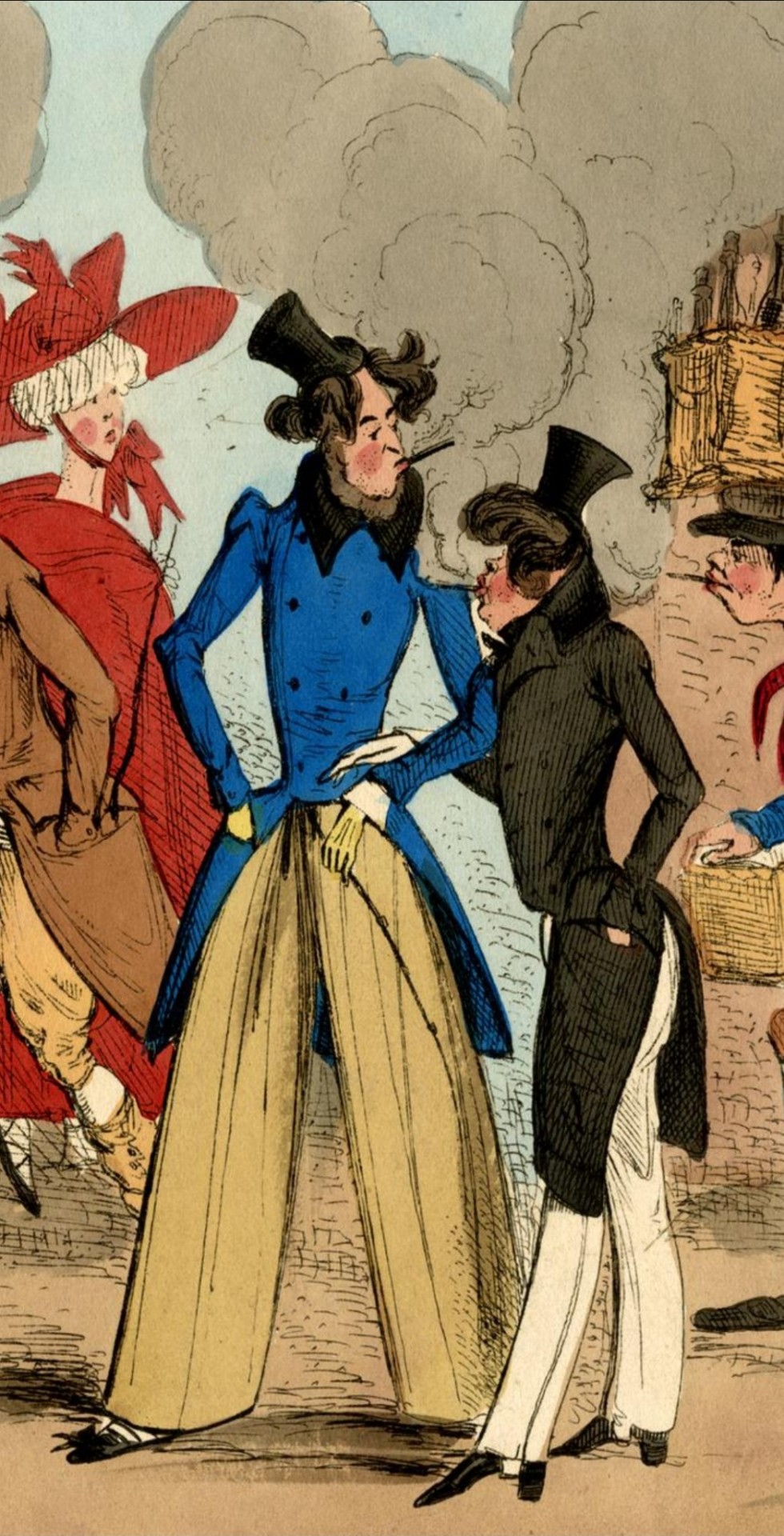
Strutting his stuff in 1827, he has an insouciant attitude and a bold, fashion-forward look. You may want to address the fact that he's also a major source of air pollution.
164 notes
·
View notes
Text
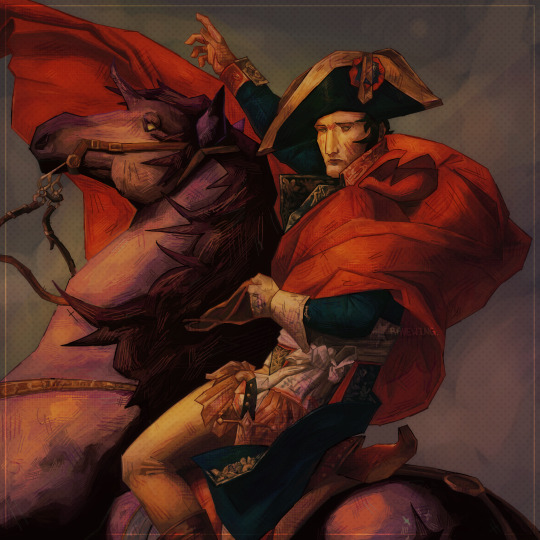
napoleon crossing the alps but its twilight sparkle
(normal vers under the cut)
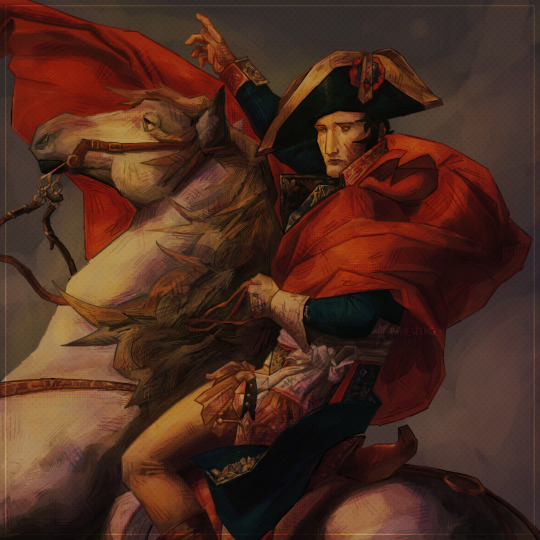
#napoleon#napoleon bonaparte#napoleonic#history#mlp#my little pony#twilight sparkle#might go to hell for this one#rave art
118 notes
·
View notes
Text
Napoleon as Apollo Belvedere, god of plagues, by Antoine-Jean Gros
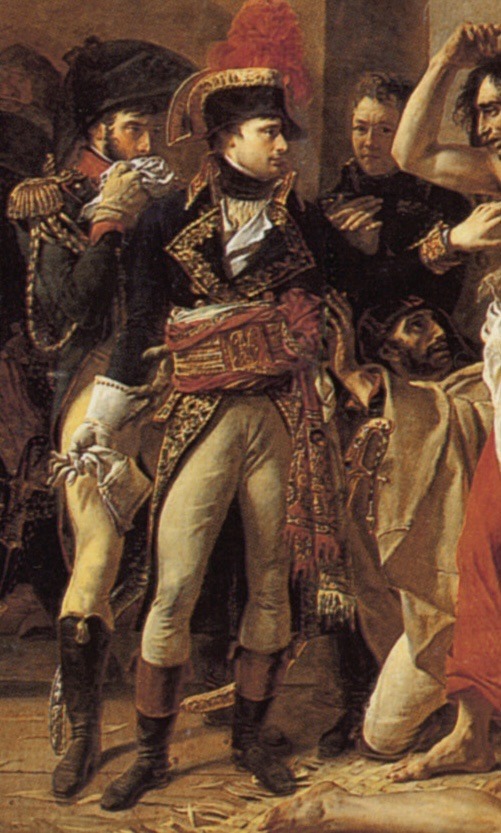
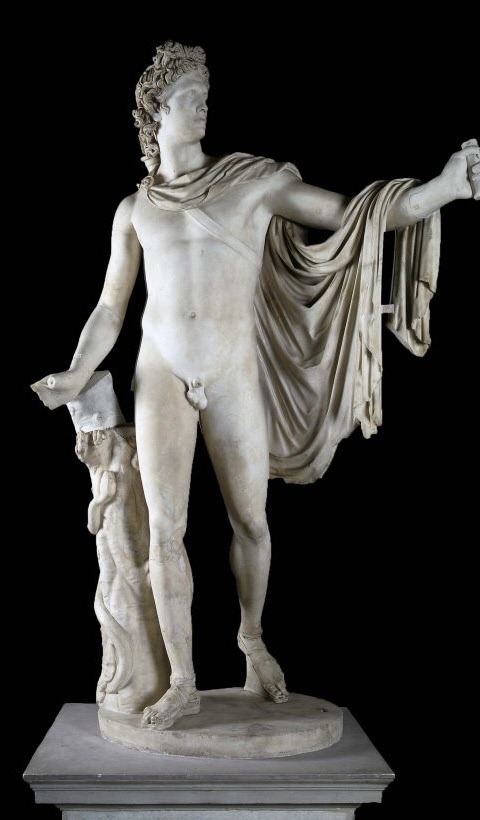
Napoleon (left), Apollo Belvedere (right)
#Antoine-Jean Gros#Gros#napoleon bonaparte#Bonaparte Visiting the Plague Victims of Jaffa#Bonaparte visitant les pestiférés de Jaffa#Apollo Belvedere#Napoleon#Apollo#Belvedere Apollo#napoleonic era#napoleonic#first french empire#french empire#19th century#history#art#art history#symbolism#history of art#classical#french revolution#neoclassical#Egypt
30 notes
·
View notes
Text
Russian blizzard

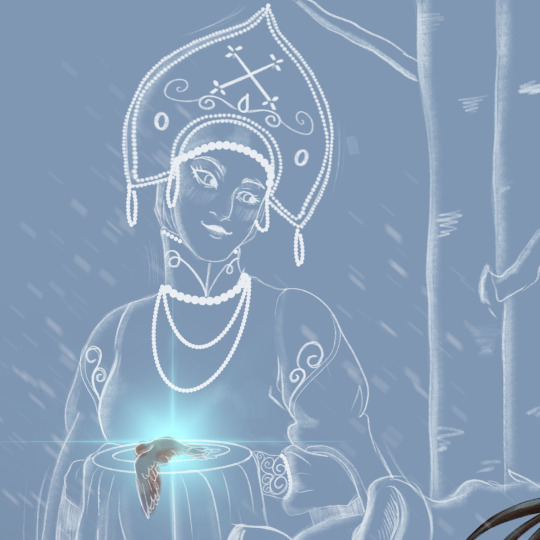
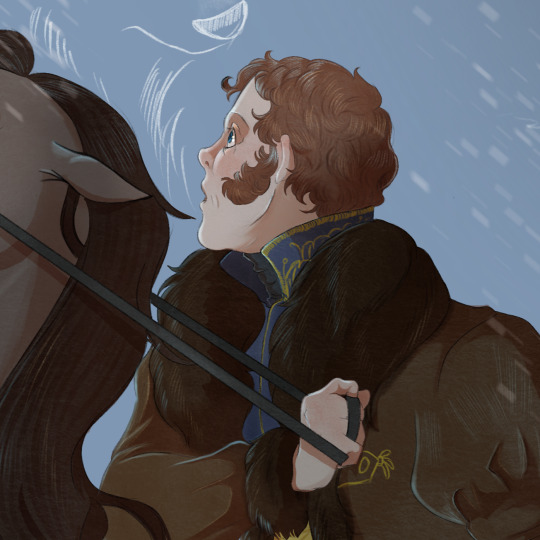
#history art#art#napoleonic#michel ney#marshal ney#19 century#french history#napoleonic art#napoleonic era#napoleonic marshals#marshalate#1812#i hate drawing horses
111 notes
·
View notes
Text
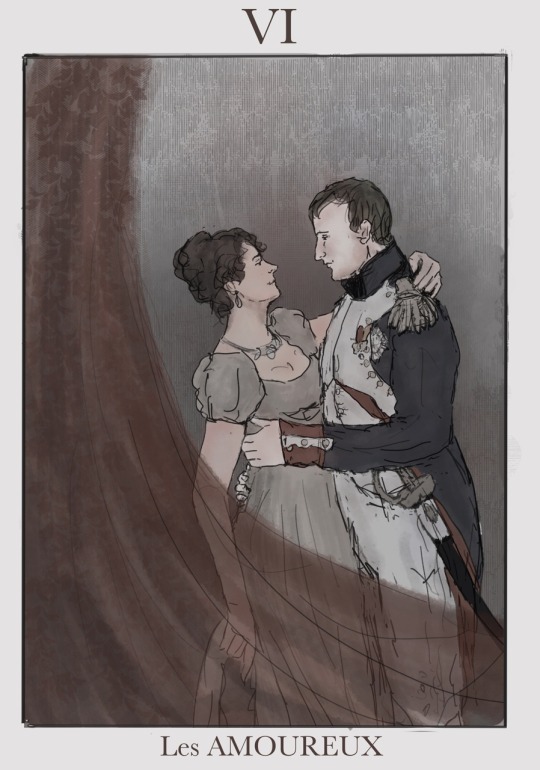
Napoleon, Josephine and the tarot cart:
VI The lovers
#history#french history#history art#napoleonic#napoleon#napoleon bonaparte#josephine beauharnais#napoleon and josephine#empress josephine#josephine bonaparte#art
148 notes
·
View notes
Text

Napoleon Bonaparte in the manga ‘The Rose Of Versailles’
#he only makes a very brief appearance but is certainly very cute and fancy#napoleon#napoleon bonaparte#the rose of versailles#manga#napoleonic#history#French Revolution#frev
143 notes
·
View notes